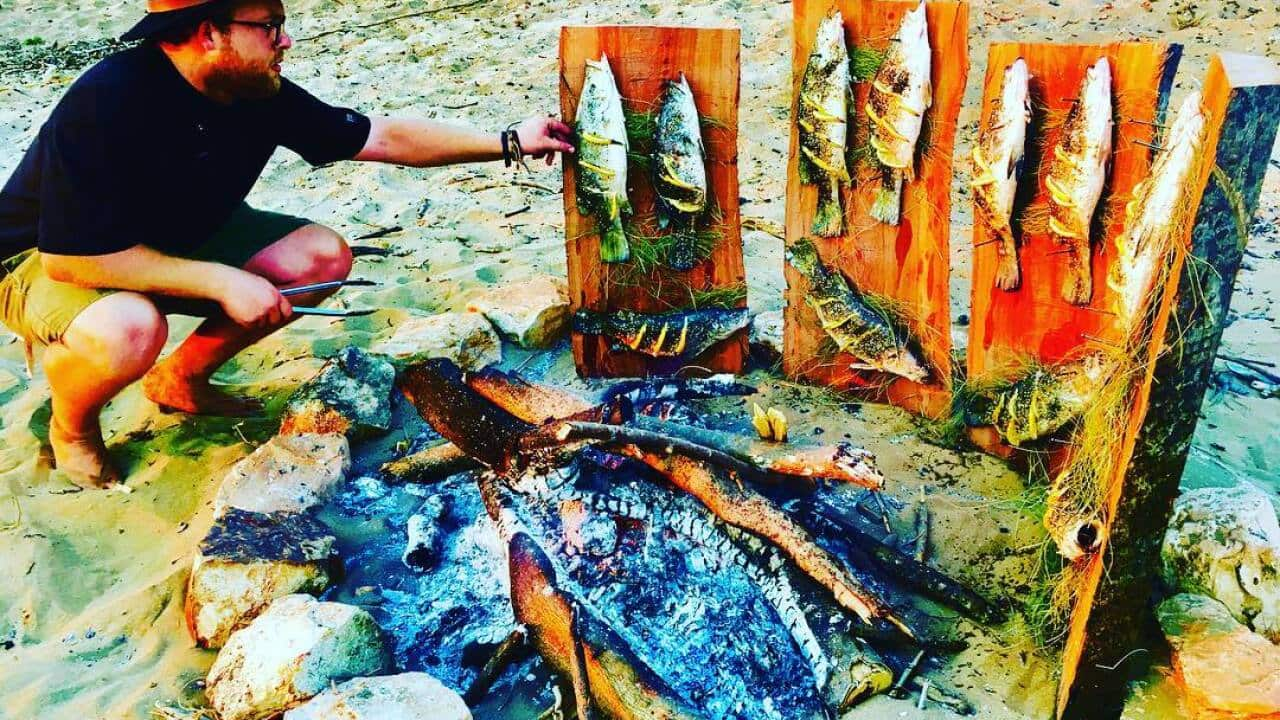Some may argue it’s not possible to undo decades upon decades of hurt, injustice and intergenerational trauma with a simple meal. They may very well be right. Zach Green, a Gunditjmara and Palawa man and one of Australia’s most exciting chefs, certainly thinks so. Food is a universal requirement – like sleep, or love – a characteristic that makes it an ideal vehicle for culture-crossing conversations. Perhaps it’s more a powerful tool than many of us realise.
“There are so many cultures present here in Australia,” he tells SBS. “You walk down Lygon Street in Melbourne, and you’re celebrating Italian culture. In Sydney’s Chinatown, it’s all about celebrating Asian culture – always through food. Now that Indigenous Australian ingredients are so popular in mainstream restaurants, it’s the perfect opportunity to celebrate Indigenous culture, too.”
“If you eat Middle Eastern food and like it, you’re more inclined to learn about the culture rather than simply casting judgement about it based on what you see in the media,” Green says. “So, meals made with Indigenous foods create an opportunity for diners to learn more about and connect with Indigenous peoples. We get to learn, rather than judge.”
Green has been pondering the idea of reconciliation through food for about three years. At first, it was a mantra and a balm to apply to his work in the kitchen while grieving the loss of not one, but two babies to miscarriage. Now, it serves as his M.O, and informs the dishes he creates, and the educational events and pop-up restaurants he stages all around the country.
His forthcoming series of pop-up events, entitled Finding Home Again, is about re-establishing roots upon returning to hometown of Mansfield, Victoria after a decade away. The first event, on February 16, is almost sold out.
“It’s all about me going back to where it all started, connecting to family and my best mates who’re still there,” he says. The plan is to take Mansfield’s local produce – bunya pine nuts, native river mint, and lemon myrtle, to name three – and create memorable dishes, all matched with local wines. Fresh crayfish, venison and kangaroo may all play a starring role, too.
Green believes that each ingredient in a dish can (and usually does) tell a story, and that these stories should be shared as widely as possible. He counts himself as one in a number of Indigenous Australian food ambassadors, including and , who share a similar goal: give a platform to the mob.
“When you pick up an ingredient like bunya nuts or lemon myrtle you think ‘that’ll taste nice in a dish’,” Green says. “And they will. But if you learn the story behind the ingredient you’ll appreciate it so much more.”
Take, for example, the yabbies Green uses to make yabbie croquettes for the summer menu at , Green’s travelling restaurant. “Yabbies just remind me of going down to the river to hunt and gather, then going back home and cooking them on a barbie with my mob.”
At a time of the year when the Internet is alight with debate erring on the side of incendiary, it’s worth pausing to reflect on how something as simple as food can bridge gulfs – not only in Australia, but in other countries where tensions between First Nations peoples and settlers run high, .
Green, of course, is acutely aware of what often feels like an uphill struggle. But if anyone’s up for it, it’s him.
“I’m going to work my ass off to get to the point where people are having positive conversations about Indigenous ingredients, learning the stories and the culture,” he says. “This isn’t going to be an overnight fix, or a six-month fix. It’s going to be a slow burn, because when a lot of people think about Indigenous people, judgement and negative opinions follow. Hopefully Elijah’s Kitchen and my work as a chef can change that mindset, and convince people that the indigenous culture is the richest and most diverse in Australia.”
Zach Green’s cooking may not save the world. Then again, maybe it just could.
Follow Chef Zach Green on and for updates on his Finding Home Again pop up events.
Learn about Indigenous ingredients

At South Melbourne Market, you'll find Mabu Mabu – a Torres Strait Islander deli






